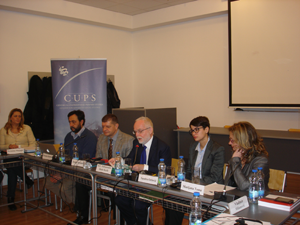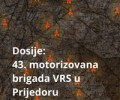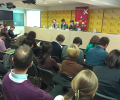Conference “The role of education in the processes of establishing accountability and reconciliation” held in Belgrade
 The Humanitarian Law Center (HLC), the Humanitarian Law Center Kosovo and the ‘Lawyer’ Association from Sarajevo, in cooperation with the Union University Faculty of Law and the Center for Comparative Studies, organized a conference on the role of education in the processes and strategies of Transitional Justice on February 6th, 2015. The Conference was held at the Union University Faculty of Law with the participation of academic communities from Bosnia and Herzegovina, Kosovo and Serbia, including university professors, researchers and research fellows in the fields of law, history, anthropology, sociology, political sciences, and other sciences and disciplines, as well as representatives of three generations of students of the Regional School of Transitional Justice.
The Humanitarian Law Center (HLC), the Humanitarian Law Center Kosovo and the ‘Lawyer’ Association from Sarajevo, in cooperation with the Union University Faculty of Law and the Center for Comparative Studies, organized a conference on the role of education in the processes and strategies of Transitional Justice on February 6th, 2015. The Conference was held at the Union University Faculty of Law with the participation of academic communities from Bosnia and Herzegovina, Kosovo and Serbia, including university professors, researchers and research fellows in the fields of law, history, anthropology, sociology, political sciences, and other sciences and disciplines, as well as representatives of three generations of students of the Regional School of Transitional Justice.
Dr. Zlatko Stefanović, the Dean of the Union University Faculty of Law, Dennis Keefe, the Ambassador of the United Kingdom to Serbia, and the Executive Director of HLC, Sandra Orlović, struck the opening notes at the Conference. In their opening words, they emphasized the necessity of introducing the subject of Transitional Justice at universities, stating that the implementation of Transitional Justice and the reconciliation process in the region of the former Yugoslavia represent the preconditions for a long-lasting peace. Professor Brandon Hamber from Northern Ireland, the Founder and Director of the International Conflict Research Institute at Ulster University in Northern Ireland, held a presentation on the development path of Transitional Justice, which has emerged as a set of measures for establishing the rule of law and stimulating the fight against impunity in post-conflict societies, towards its becoming a new academic field of studies. Through his own lecturing experience, but also through the experience of founding the Center for Study of Violence and Reconciliation in Johannesburg and the research work within this Center, Professor Hamber presented one of the successful examples of the introduction of Transitional Justice into the system of formal education.
The first session, The role of the academic community in the processes of Transitional Justice in Bosnia and Herzegovina, Serbia and Kosovo – in which Vesna Rakić Vodinelić, Professor at the Union University Faculty of Law in Belgrade, Zarije Seizović, Professor at the Faculty of Political Sciences of the University of Sarajevo, and Nita Luci, Professor at the University of Priština Faculty of Philosophy, spoke – also dealt with the challenges by political elites and the lack of sufficient support and political will, which stand as obstacles in all three regions when it comes to the introduction of Transitional Justice to universities. The opening speakers during the session relating to formal and informal education, were a Professor from the University of Belgrade Faculty of Political Sciences, Daša Duhaček, a Professor from the University of Sarajevo Faculty of Political Sciences, Nermina Mujagić, and a Professor Adriatik Kelmendi from AAB University in Priština. They stressed that in the existing situation, with no support from the political elites in any of the countries in the region, the individual initiatives of each professor, within their own curriculum and within the programmes of informal education, may be of the greatest significance as the first steps of one comprehensive initiative. All of the participants assessed the regional approach to the introduction of Transitional Justice as being essential and necessary, and with regard to this, possible cooperation between the universities in the region was also discussed.
Finally, the last session, New generations: confronting old narratives was dedicated to the presentations of all three generations of students of the Regional School of Transitional Justice. Seid Burić and Jasmina Dreković from Bosnia and Herzegovina, Višnja Šijačić and Norbert Šinković from Serbia and Nentor Oseku and Feride Podvorica from Kosovo, spoke during this session. Their presentations particularly pointed to all of the shortcomings in formal education, and the real needs of the new generations, which have grown up in societies which have not overcome inter-ethnic tensions and which have not dealt with their own past.









